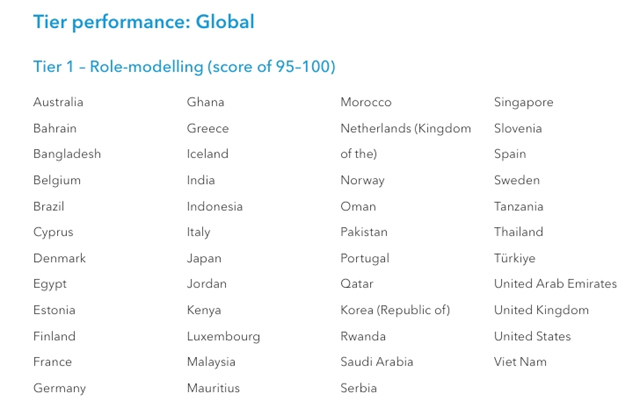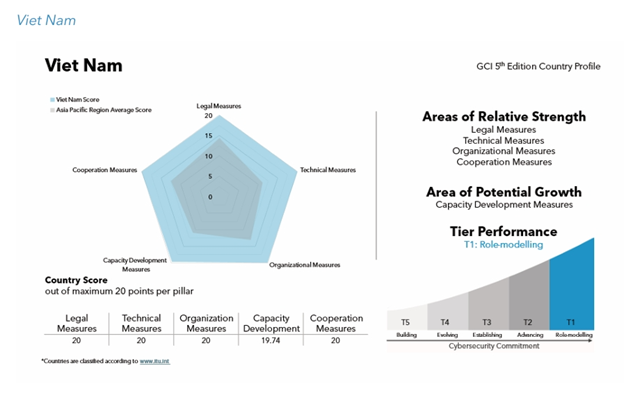The International Telecommunication Union (ITU) has released the Global Cybersecurity Index (GCI) for 2024, indicating that while nations are ramping up their cybersecurity efforts, more robust action is needed to counter rising threats.
According to ITU Secretary-General Doreen Bogdan-Martin, “building trust in the digital world is of utmost importance.” She considers the progress reflected in the GCI 2024 as a sign that we must focus all our efforts on ensuring that everyone, everywhere, can manage security risks in an increasingly complex digital world.
 Vietnam is one of 46 countries ranked in the top group of ITU’s global information security index. Image: ITU
|
The GCI 2024 assesses nations’ efforts based on five criteria, reflecting their national cybersecurity commitments: legal, technical, organizational, capacity building, and cooperative. ITU has also refined its evaluation methodology to better focus on each country’s progress in security commitments and their impact.
Countries are ranked into five groups, with Group 1 being the highest, comprising 46 nations, serving as “role models.” ITU notes that these Group 1 countries have shown significant progress since the previous GCI in 2021.
 Vietnam achieved a total score of 99.74 across the five criteria. Image: ITU
|
Vietnam falls within Group 1 with a total score of 99.74. It achieved the maximum score of 20 points in four criteria: legal measures, technical measures, organizational measures, and coordination measures. The capacity building criterion received a score of 19.74 points.
According to the report, legal measures are the most important cybersecurity pillar for most countries: 177 nations have at least one regulation related to data protection, privacy protection, or breach notification. Additionally, 139 countries have computer incident response teams (CIRTs) at various levels of development, and 132 nations possess a National Cybersecurity Strategy (NCS).
Cyberspace awareness campaigns are also prevalent, with 152 countries conducting initiatives to raise awareness among the general public. Some countries specifically target vulnerable and minority demographic groups in these campaigns.
Many nations cooperate on cybersecurity through existing treaties: 166 countries, equivalent to 92% of the total, are part of an international treaty or equivalent cooperative mechanism for capacity building, information sharing, or both. However, ITU notes that operationalizing cybersecurity agreements and frameworks remains challenging.
In terms of education and training, 123 countries reported having programs for cybersecurity experts. Cybersecurity education is incorporated into curricula to varying degrees in 153 nations, and 164 countries have legal measures in place to protect children online.
First introduced in 2015, the GCI aims to support countries in identifying areas for improvement and encouraging them to take action to develop capabilities across each criterion. The index continuously evolves to adapt to changing risks, priorities, and resources, providing the most comprehensive picture of each country’s cybersecurity measures.
Du Lam
The Art of the Scam: Uncovering the Tactics Used to Target Large Corporations
The Ho Chi Minh City Police warn the public to be vigilant against fraudsters using the images of prominent business leaders and entrepreneurs to scam unsuspecting victims. These scammers exploit the reputation and influence of well-known company directors and business owners to deceive and defraud innocent people. It is a despicable act that preys on the trust and admiration associated with these respected individuals.
Deceptive Tactics Alert: Fraudsters Impersonating Tax Authorities to Steal Your Money
In recent times, scammers have been employing a devious tactic: they pretend to be tax officials and request that individuals install malicious software. This is a cunning attempt to steal personal information and finances. It is imperative that people remain vigilant and aware of such deceitful practices to protect themselves from becoming victims of these insidious scams.
From Finance to… Coconuts: UOB’s Phishing Test and Betrimex’s Automated Coconut Counter
“The representatives from UOB bank emphasize the importance of focusing on practical and necessary digital transformation investments for current operations. It’s crucial to avoid over-extending as technology evolves rapidly and is costly. A leading coconut enterprise, Betrimex, has recently developed an automatic coconut counting system, a technology that isn’t groundbreaking globally but is essential for their specific operations.”




















